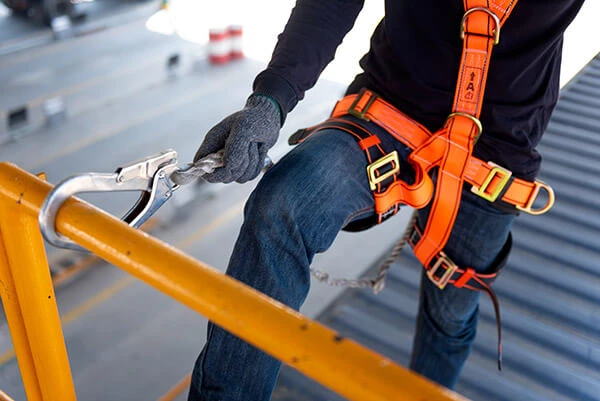The Importance of Sleep
Published 4.11.2022
The importance of adequate sleep cannot be overstated. We are all aware that sleep has many effects on a variety of aspects of our health; the way you feel awake has a link to what kind of sleep you get at night. Poor sleeping habits can lead to an acute sudden incident, such as a car crash due to a tired driver, or chronic problems over the long term, such as a number of health issues.
Research has shown up to 40% of Americans are sleep deprived. This causes many issues in the workplace and at home while completing tasks. Studies have also shown that sleep deprivation can significantly reduce our reaction time, motor control, decision-making ability, and situational awareness. This creates an unsafe condition where we are all exposed to a potential incident that could cause injury.
6 Tips to be Well-Rested
- Get at least seven hours of sleep. Studies vary on exactly how much each person needs, but the consensus is between six and eight hours.
- Shut your TV off and place your phone face down. Blue light and other light sources can disrupt your sleep.
- Keep your room between 68- and 72-degrees Fahrenheit. This is the range that is best for sleeping conditions for most people.
- If you must take a nap during the day, keep it under 20 minutes.
- Abstain from caffeine, alcohol, and large meals in the hours leading up to bedtime.
- Go to bed and wake up at the same time every night. This keeps your internal clock on track and your body gets into a routine.
If you have trouble falling asleep at night here is a science-based trick to help you fall asleep faster. This method will take about 6 weeks to master, but once you do, you will be asleep in two minutes.
- Relax your entire face, including the muscles inside your mouth.
- Drop your shoulders to release the tension and let your hands drop to the side of your body.
- Exhale, relaxing your chest.
- Relax your legs, thighs, and calves.
- Clear your mind for 10 seconds by imagining a relaxing scene.
- If this doesn’t work, try saying the words “don’t think” over and over for 10 seconds.
- Within 10 seconds, you should fall asleep!
Remember This!
Sleep is an essential function that allows your body and mind to recharge, leaving you refreshed and alert when you wake up. Healthy sleep also helps the body remain healthy and stave off diseases. Without enough sleep, the brain cannot function properly.
Heat Stress
Published 4.18.2022
Did you know your body is constantly in a struggle to disperse the heat it produces? Most of the time, you are hardly aware of it – unless your body is exposed to more heat than it can handle. Heat-related illnesses can escalate rapidly, leading to delirium, organ damage and even death. There are several heat-related illnesses, including heat cramps, heat exhaustion and the most severe, heatstroke.
HEAT CRAMPS
- This person perspires heavily and may have been drinking fluids throughout the day. As you sweat, your body loses water and salt. The water is usually replenished, but loss of salt can cause cramping. Cramps can develop in the legs, arms, and abdomen. Other signs are dizziness and fainting.
- Move the person to a cool place and administer fluids with electrolytes. If the cramping does not subside, or if the person becomes worse or you feel the person needs further care, contact emergency personnel.
HEAT EXHAUSTION
- This person has been working or playing in a hot environment and has been exposed to excessive heat. The body has lost water and salt. The outside temperature and humidity are making it difficult for the body to cool itself. Results may include shallow breathing, cold clammy skin, dizziness, weakness, heavy perspiration, and possibly unconsciousness.
- Administer fluids with electrolytes if they are conscious, move person to a cool place and contact emergency personnel if the person does not improve quickly or you feel the person needs further care.
HEAT STROKE
THIS IS AN EMERGENCY! This is the next stage after heat exhaustion. A person’s body is not able to rid itself of excessive heat and the body stops sweating. This person may have one or more of the following symptoms: deep breathing, shallow breathing, red skin, a strong or rapid pulse, dilated pupils, seizures, and unconsciousness. Emergency personnel should be contacted immediately! Try to cool the person and wait for emergency personnel.
Remember This!
These are your body’s warning signs that your core temperature is rising. Heat stress can occur suddenly. It can also be dangerous, resulting in organ or brain damage and even death.
Heat Stress Prevention
Published 4.25.2022
So, we know that Heat Stress occurs when the body is unable to cool itself; there are many factors that may cause heat-related illnesses. High temperatures during summer months are the most obvious causes of heat stress, but there are other factors that contribute to this condition, including:
• Dehydration
• Extreme heat
• Some medications
• Bulky clothing
• Poor physical condition or ongoing health problems
• Limited air movement
• Excessive alcohol intake the day before
• Direct sun exposure
• Previous heat-related illnesses
• Physical exertion
As Benjamin Franklin said, “An ounce of prevention is worth a pound of cure.” That axiom is as true as any other when it pertains to our personal safety. The most important element is proper body hydration. It is important to keep the intake of fluids equal to the amount being released through sweating or urination throughout the day. An important step to remember is to begin hydrating the body before dehydration starts. As you begin to sweat, you are losing precious mineral salts and electrolytes which are needed to keep your body safely balanced.
Frequent breaks are necessary. Develop and implement a work/rest cycle based upon the type and duration of work being performed. If possible, heavy work should be scheduled for early morning hours or possibly at night. Clothing plays a large part in your body’s ability to control its temperature. You should wear loose-fitting, breathable, light-colored clothing.





